Related Research Articles
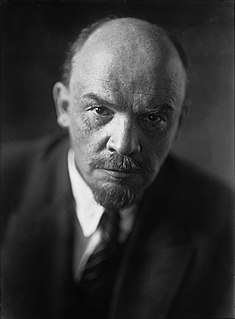
Leninism is a political ideology developed by Russian Marxist revolutionary Vladimir Lenin that proposes the establishment of the dictatorship of the proletariat led by a revolutionary vanguard party, as the political prelude to the establishment of communism. The function of the Leninist vanguard party is to provide the working classes with the political consciousness and revolutionary leadership necessary to depose capitalism in the Russian Empire (1721–1917). Leninist revolutionary leadership is based upon The Communist Manifesto (1848) identifying the communist party as "the most advanced and resolute section of the working class parties of every country; that section which pushes forward all others." As the vanguard party, the Bolsheviks viewed history through the theoretical framework of dialectical materialism, which sanctioned political commitment to the successful overthrow of capitalism, and then to instituting socialism; and, as the revolutionary national government, to realize the socio-economic transition by all means.
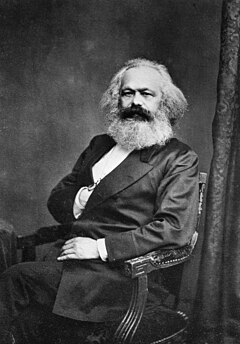
Karl Marx's theory of alienation describes the estrangement of people from aspects of their human nature as a consequence of living in a society of stratified social classes. The alienation from the self is a consequence of being a mechanistic part of a social class, the condition of which estranges a person from their humanity.

In Marxist philosophy, cultural hegemony is the dominance of a culturally diverse society by the ruling class who manipulate the culture of that society—the beliefs and explanations, perceptions, values, and mores—so that the worldview of the ruling class becomes the accepted cultural norm. As the universal dominant ideology, the ruling-class worldview misrepresents the social, political, and economic status quo as natural, inevitable, and perpetual social conditions that benefit every social class, rather than as artificial social constructs that benefit only the ruling class.
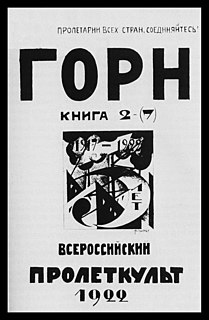
Proletkult, a portmanteau of the Russian words "proletarskaya kultura", was an experimental Soviet artistic institution that arose in conjunction with the Russian Revolution of 1917. This organization, a federation of local cultural societies and avant-garde artists, was most prominent in the visual, literary, and dramatic fields. Proletkult aspired to radically modify existing artistic forms by creating a new, revolutionary working-class aesthetic, which drew its inspiration from the construction of modern industrial society in backward, agrarian Russia.
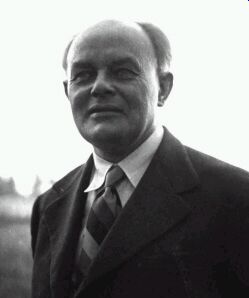
Karl Heinrich Otto Rühle was a German Marxist active in opposition to both the First and Second World Wars as well as a council communist theorist.
New Democracy, or the New Democratic Revolution, is a concept based on Mao Zedong's Bloc of Four Social Classes theory in post-revolutionary China which argued originally that democracy in China would take a path that was decisively distinct from that in any other country. He also said every colonial or semi-colonial country would have its own unique path to democracy, given that particular country's own social and material conditions. Mao labeled representative democracy in the Western nations as Old Democracy, characterizing parliamentarianism as just an instrument to promote the dictatorship of the bourgeoisie/land-owning class through manufacturing consent. He also found his concept of New Democracy in contrast with the Soviet-style dictatorship of the proletariat which he assumed would be the dominant political structure of a post-capitalist world. Mao spoke about how he wanted to create a New China, a country freed from the feudal and semi-feudal aspects of its old culture as well as Japanese imperialism.
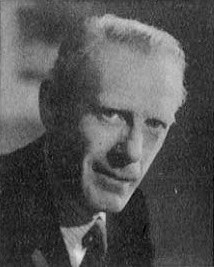
James Francis "Frank" Horrabin was an English socialist and sometimes Communist radical writer and cartoonist. For two years he was Labour Member of Parliament for Peterborough. He attempted to construct a socialist geography and was an associate of David Low and George Orwell.
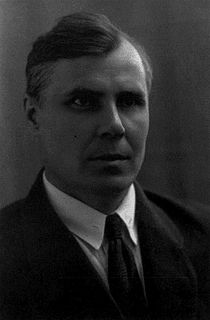
Mikhail Prokofyevich Gerasimov was one of the most widely read working-class poets in early-twentieth-century Russia. Initially embracing the Bolshevik Revolution as a liberating event and participating in the effort to create a new proletarian culture, following the New Economic Policy he became disillusioned and was imprisoned during the Joseph Stalin era.
George S. Yates was a British socialist politician.
Cedar Paul, néeGertrude Mary Davenport was a singer, author, translator and journalist.
Maurice Eden Paul was a British socialist physician, writer and translator.
The Plebs' League was a British educational and political organisation which originated around a Marxist way of thinking in 1908 and was active until 1926.
The Central Labour College, also known as The Labour College, was a British higher education institution supported by trade unions. It functioned from 1909 to 1929. It was established on the basis of independent working class education.
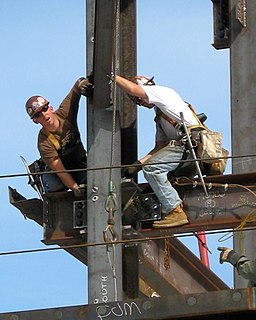
The working class comprises those engaged in manual-labour occupations or industrial work, who are remunerated via waged or salaried contracts. Working-class occupations include blue-collar jobs, and most pink-collar jobs. Members of the working class rely exclusively upon earnings from wage labour; thus, according to more inclusive definitions, the category can include almost all of the working population of industrialized economies, as well as those employed in the urban areas of non-industrialized economies or in the rural workforce.

Impossibilism is a Marxist theory that stresses the limited value of political, economic, and social reforms under capitalism. As a doctrine, impossibilism views the pursuit of such reforms as counterproductive to the goal of achieving socialism as they stabilize, and therefore strengthen, support for capitalism. Impossibilism holds that reforms to capitalism are irrelevant or outright counter-productive to the goal of achieving socialism and should not be a major focus of socialist politics.
The National Council of Labour Colleges (NCLC) was an organisation set up in the United Kingdom to foster independent working class education.

In Marxist philosophy, the dictatorship of the proletariat is a state of affairs in which the proletariat holds political power. The dictatorship of the proletariat is the intermediate stage between a capitalist economy and a communist economy, whereby the post-revolutionary state seizes the means of production, compels the implementation of direct elections on behalf of and within the confines of the ruling proletarian state party, and instituting elected delegates into representative workers' councils that nationalise ownership of the means of production from private to collective ownership. During this phase, the administrative organizational structure of the party is to be largely determined by the need for it to govern firmly and wield state power to prevent counterrevolution and to facilitate the transition to a lasting communist society. Other terms commonly used to describe the dictatorship of the proletariat include socialist state, proletarian state, democratic proletarian state, revolutionary dictatorship of the proletariat and democratic dictatorship of the proletariat.
In the context of the theory of Leninist revolutionary struggle, vanguardism involves a strategy whereby the most class-conscious and politically "advanced" sections of the proletariat or working class, described as the revolutionary vanguard, form organizations in order to draw larger sections of the working class towards revolutionary politics and serve as manifestations of proletarian political power opposed to the bourgeois.
The proletariat is the social class of wage-earners, those members of a society whose only possession of significant economic value is their labour power. A member of such a class is a proletarian. Marxist philosophy considers the proletariat to be exploited under capitalism, forced to accept meager wages in return for operating the means of production, which belong to the class of business owners, the bourgeoisie.

Permanent revolution is the strategy of a revolutionary class pursuing its own interests independently and without compromise or alliance with opposing sections of society. As a term within Marxist theory, it was first coined by Karl Marx and Friedrich Engels as early as 1850, but since then it has been used to refer to different concepts by different theorists, most notably Leon Trotsky.
References
- ↑ Waugh, Colin (20 May 2014). "Rediscovering Independent Working Class Education by Colin Waugh". Ragged University. Retrieved 22 January 2019.
- 1 2 3 Paul, Eden; Paul, Cedar (1921). Proletcult (proletarian culture). New York: T. Seltzer, inc.